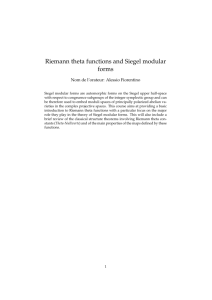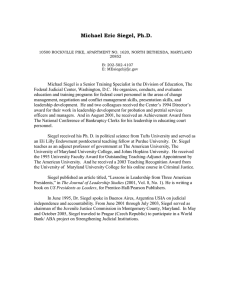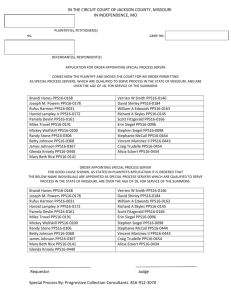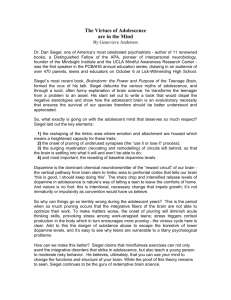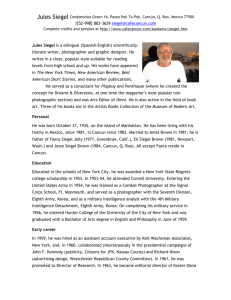1
advertisement
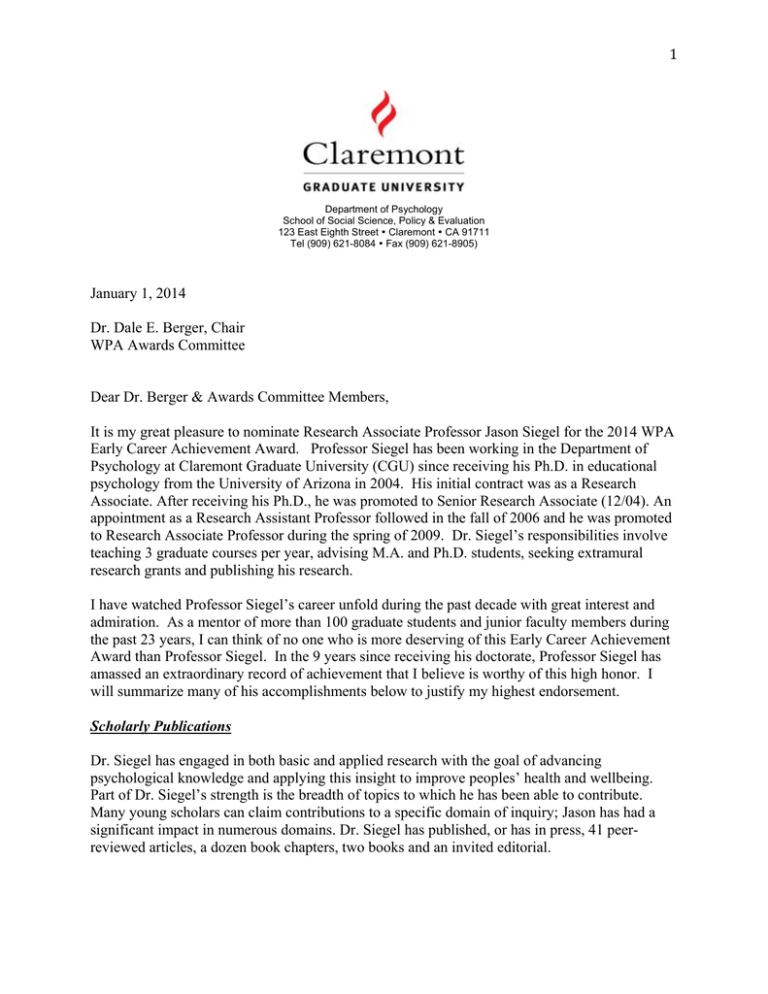
1 Department of Psychology School of Social Science, Policy & Evaluation 123 East Eighth Street Claremont CA 91711 Tel (909) 621-8084 Fax (909) 621-8905) January 1, 2014 Dr. Dale E. Berger, Chair WPA Awards Committee Dear Dr. Berger & Awards Committee Members, It is my great pleasure to nominate Research Associate Professor Jason Siegel for the 2014 WPA Early Career Achievement Award. Professor Siegel has been working in the Department of Psychology at Claremont Graduate University (CGU) since receiving his Ph.D. in educational psychology from the University of Arizona in 2004. His initial contract was as a Research Associate. After receiving his Ph.D., he was promoted to Senior Research Associate (12/04). An appointment as a Research Assistant Professor followed in the fall of 2006 and he was promoted to Research Associate Professor during the spring of 2009. Dr. Siegel’s responsibilities involve teaching 3 graduate courses per year, advising M.A. and Ph.D. students, seeking extramural research grants and publishing his research. I have watched Professor Siegel’s career unfold during the past decade with great interest and admiration. As a mentor of more than 100 graduate students and junior faculty members during the past 23 years, I can think of no one who is more deserving of this Early Career Achievement Award than Professor Siegel. In the 9 years since receiving his doctorate, Professor Siegel has amassed an extraordinary record of achievement that I believe is worthy of this high honor. I will summarize many of his accomplishments below to justify my highest endorsement. Scholarly Publications Dr. Siegel has engaged in both basic and applied research with the goal of advancing psychological knowledge and applying this insight to improve peoples’ health and wellbeing. Part of Dr. Siegel’s strength is the breadth of topics to which he has been able to contribute. Many young scholars can claim contributions to a specific domain of inquiry; Jason has had a significant impact in numerous domains. Dr. Siegel has published, or has in press, 41 peerreviewed articles, a dozen book chapters, two books and an invited editorial. 2 Organ Donation Dr. Siegel started his scholarship in the organ donor domain when he was a graduate student and continues to publish in this area (e.g., Siegel, Alvaro, & Jones, 2005; Siegel, Alvaro, Lac, Crano, & Alexander, 2008; Siegel et al., 2010; Siegel, Alvaro, Hohman, & Maher, 2011). Dr. Siegel has successfully taken psychological theories and frameworks and applied them with the goal of increasing the number of organs available for transplantation (e.g., Siegel, Alvaro, Pace-Jones, Crano, Lac, & Ting, 2008; Siegel, Navarro, Tan, & Hyde, in press). One example of Dr. Siegel using psychological scholarship to improve the lives of others is the work he has done to reduce health disparities. Working with his colleague Dr. Alvaro, Dr. Siegel used theories of persuasion, such as vested interest theory to create campaigns to increase the number of organ available for transplantation among Hispanics (Alvaro, Siegel, Crano & Dominick, 2010; Siegel, Alvaro, & Jones, 2005; Siegel, Alvaro, Lac, Crano, & Alexander, 2008). Further, Dr. Siegel has investigated ways of overcoming psychological and economic barriers to living donation among recent immigrants (Siegel et al., 2011; Siegel, O’Brien, Alvaro, & Paulson, in press). Complementing his work increasing the availability of transplantable organs among Hispanics, Dr. Siegel recently published articles on a new model he created, the IIFF Model (Siegel, et al., 2011). Many people in the organ donor domain were using the Theory of Planned Behavior (TPB) to guide interventions. The inconsistent success in the application of TPB motivated Dr. Siegel to examine its basic assumptions. Realizing that the model is only intended to be effective when attitudes, norms, and beliefs of perceived behavioral control regarding the behavior are activated. The challenge with organ donation is that the topic is rarely top of mind. As such, the Theory of Planned Behavior had been vastly underperforming. With this in mind, Dr. Siegel created a framework, the IIFF Model, that provides components that must be present for people with positive attitudes toward donation to act in accord with those attitudes and register as an organ donor: 1) an immediate and complete registration mechanism, 2) information, 3) focused engagement, and 4) favorable activation. In contexts where registration rates hover around 12%, the IIFF Model has led to rates averaging 40% (Siegel et al., 2011). Evidence of the success of the model includes an article that discusses the model in APA’s Monitor on Psychology (Novotney, 2011), and the selection of the model to be presented as part of the Health Resources and Services Administration Grantee Showcase. Out of nearly 100 funded grant projects, only four were selected to present as part of the showcase. Dr. Siegel was also selected to present to the Department of Health and Human Services Advisory Council on Organ Donation and the American Society of Multicultural Health and Transplant Professionals. Further evidence of Dr. Siegel’s push to simultaneously contribute to psychological scholarship and the health of others is present in a publication he recently had accepted for publication in Health Psychology. Dr. Siegel noticed that some measures of organ donation attitudes focus on attitudes toward “organ donation” but others inquire specifically about registering as an organ donor. Diving into the literature, Dr. Siegel came across Ajzen and Fishbeins’ (1970; also Ajzen, 2011) principle of compatibility, which states that attitudes are most likely to be associated with 3 behavior when both are measured at the same level of specificity. This might seem obvious, but psychological literature boasts a cornucopia of articles that fail to recognize the principle. Hoping to improve both psychological scholarship and scholarship focused specifically on organ donation, Dr. Siegel, along with two of his students and an international colleague, conducted a couple of studies highlighting a 250% increase in the predictive power of attitudes when items inquire specifically about organ donor registration rather than organ donation in general (Siegel, Navarro, Tan, & Hyde, in press). Substance Abuse The only topic Dr. Siegel has been studying longer than organ donation is substance abuse. As will be discussed shortly, Dr. Siegel entered graduate school with a desire to find ways to help people who are fighting depression to seek help. However, there was no research being done on the topic at that time. Dr. Siegel knew he would have to learn the persuasion ropes by working in a field where there was already vast interest. Dr. Siegel began by investigating cigarette use. He examined campaign topics that are often overlooked (Siegel, Alvaro, & Burgoon, 2003) and the problem of self-efficacy deficits when it came to monitoring youth tobacco access (Siegel & Alvaro, 2003). These papers were published prior to Jason receiving his doctorate. Next, he turned to inhalant use as a co-investigator on a federally funded grant (William D. Crano, PI). In addition to successfully creating ads that reduced adolescents’ intentions to use inhalants (Crano, Siegel, Alvaro, & Patel, 2007), Dr. Siegel revealed that a desire for popularity is a driving force on adolescent inhalant use (Siegel, Alvaro, Patel, & Crano, 2009) and that expectations also play a role in the equation (Siegel, et al., 2008). Most recently, Dr. Siegel, working with his colleagues and his students, began investigating ways in which parents can play an increased role in reducing marijuana use among adolescents. Recent publications include an assessment of the factors that mediate the relationship between parents use and the usage patterns of their adolescents (Miller, Siegel, Hohman, & Crano, 2013); an investigation into how anti-drug ads influence adolescents by motivating parental communication (Hyansuriya, Siegel, & Crano, 2013), as well as psychological constructs that are most predictive of future use (Siegel et al., 2013). Depression Professor Siegel’s work in the substance abuse and persuasion domain gave him the experience and confidence to begin a new stream of research focused on influencing people with depression to seek help. This work is filling an unfortunate void created by the lack of collaboration between clinical and social psychologists. One of Dr. Siegel’s goals upon entering graduate school was to increase the provision of help to people with depression. However, while clinical psychologists have long sought to increase the number of people with depression who seek help, and social psychologists have invested decades investigating persuasion, the topic of persuading people with depression to seek help has fallen through the cracks. This is particularly problematic as approximately 50% of people who commit suicide do so without telling another person. 4 Evidence of the lack of scholarship in this domain, and the unfortunate ramifications of the lack of focus, are reports of campaigns seeking to increase help provision to people with depression that have backfired. In recent publications, Dr. Siegel, working with his students, has published articles showing the potential for boomerang effects when people with depression are targeted with messages that do not take into account the unique processing biases of people with depression. For example, a message such as “many people have sought help for depression,” could be interpreted as “well, since other people have sought help, but I feel I cannot, I must be as hideous as a person as I believe I am.” When it comes to his depression research, Dr. Siegel is creating a line of important research where one did not exist previously. Persuading people with depression was seen as a task that was no different than persuading people to buy laundry detergent. Dr. Siegel has worked vehemently over the past several years to build up a stream of research focused on the topic area. Most impressive is that he was able to do so while maintaining streams of research applying psychological scholarship to organ donation and substance abuse. Dr. Siegel first presented his work on depression to the scientific community at WPA’s 2012 annual conference. This was followed by numerous publications. One publication (Lienemann, Siegel, & Crano, 2012) highlights how depression ads might appear to be effective among people without depression could lead to reduced help seeking among people with depression. Two additional publications (Siegel et al., 2012; Keeler, Siegel, & Alvaro, 2013) highlight possible means for increasing help seeking among Hispanics with depression. Another publication highlights how depression can impair doctor-patient communication (Gonzalez, Siegel, Alvaro, O’Brien, 2013). Three additional publications have been invited for resubmission. One (Lienemann & Siegel, under review) highlights the role played by psychological reactance in the rejection of messages targeting people with depression. Another (Keeler & Siegel, under review) investigates the mediating role played by perceived family cohesion as a moderator of the relationship between depression and help seeking. One of Dr. Siegel’s most important contributions is also in the revise and resubmit process (Siegel, Lienemann, & Tan, under review). This set of studies is indicative of the work done by Dr. Siegel. Dr. Siegel scanned decades of literature to fine a persuasive approach that might be useful for finding a means of increasing help seeking among people with depression. It was Walster and Festinger‘s (1962) overheard communication technique that drew Jason’s attention. In short, this technique led to the creation of messages that used misdirection; instead of directly communicating with people with depression (e.g., “Are you depressed?”) an “overheard” approach was used (e.g., “Do you know someone who is depressed”?). This minor adjustment resulted in messages that led to significantly more favorable help seeking intentions among people with depression. This stream of research can have a drastic impact on how campaign efforts attempt to increase help seeking among people with depression. Further, this is a stellar example of how social psychologists can contribute to efforts usually limited to those in the clinical realm. 5 Goal Disruption Theory Professor Siegel has also developed Goal Disruption Theory, a framework that brings together classic and current scholarship to explain when goal expectancy violations (e.g., learning of an unexpected pay cut) are most likely to cause psychological imbalance and the range of outcomes that occur as a result. Dr. Siegel believes many instances of irrational behavior and poor decision-making can be traced back to responses to unexpected frustrations. Similar to other scholarship conducted by Dr. Siegel, he scoured literature from the past and present to develop his theory. For example, the biggest influence on his thinking came from Edward Tolman and his seminal text on purposive behavior. Further, this theory marks a return to a system-wide approach towards explaining human behavior. After publishing a couple of articles on some of the foundational constructs (Lewandowski, Rosenberg, Parks, & Siegel, 2011; Siegel, 2011), goal disruption theory was presented to the scientific community through a symposium hosted by Dr. Siegel and his students at WPA’s 2012 annual meeting. Additional publications followed (Rosenberg, Lewandowski, & Siegel, 2013; Siegel, 2013; Siegel et al., 2012) and four more manuscripts are currently under review. These papers, most consisting of several experiments, indicate that the unexpected quality of goal violations has a unique impact on a suite of psychological constructs (e.g., an increased willingness to endure harm, an increased need for structure, increased rumination, reduced creativity, and a reduced ability to disengage from the disrupted goal). Further, people experiencing an unexpected goal violation engage in thought processes similar to those found among people with alcohol myopia. It is with this in mind that Dr. Siegel recommends we rethink the practice of providing people with bad news and then asking for immediate decision to be made, particularly in medical contexts. Conference Presentations Nearly every one of Professor Siegel’s publications can be traced back to a presentation at a professional conference (see listings on CV). For example, Professor Siegel has been involved in 27 different WPA presentations between 2008 and 2012. Further, Dr. Siegel has submitted two symposiums consisting of ten papers for the 2014 conference. Dr. Siegel is also serving as a reviewer for this year’s WPA conference. Professor Siegel’s professional conference contributions extend well beyond his WPA presentations. Dr. Siegel has presented his research at conferences such as the Society for Personality and Social Psychology, the Society for the Psychological Study of Social Issues, and the American Psychological Association. Further, Dr. Siegel has brought psychological perspectives to conferences focused on topics such as prevention science (Society of Prevention Research), communication (international Communication Association), and health (American Public Health Association). Invited Talks Professor Siegel is often invited to share his psychological knowledge and skills as a methodologist by agencies seeking to learn whether their attempts to change behavior were 6 successful. For example, the Center for Disease Control recently invited Dr. Siegel to conduct a webinar focused on providing tips for evaluating whether social media efforts were successful in increasing healthy behaviors. Dr. Siegel was one of four selected, out of over 100 grant projects, for a grantee showcase put on by the Health Resources and Services Administration. Dr. Siegel’s expertise in psychological research methods led larger organizations such as the U.S. Department of Labor, NBC/Universal’s Office of Marketing and Consumer Intelligence, and the American Evaluation Association to invite him to put on workshops. Smaller organizations relying on Dr. Siegel include the Adult College Completion Network and the Energy Center of Wisconsin. Grant Activity Professor Siegel has also been successful at obtaining federal funding for his research. He is currently funded by four different Federal grants—each one applies psychological scholarship to the health domain. This research is currently funded by the National Institute on Drug Abuse and the U.S. Department of Health and Human Services. He has also received grants and contracts from the Center for Disease Control, the U.S. Department of Labor, and smaller organizations such as the Blaise Family Foundation. He also has four grant proposals under review. The majority of these federally funded projects were funded by the Health Resources and Services Administration/Division of Transplantation (HRSA/DoT): Maximizing donor registry utilizing full service kiosks (2002 – 2005, Co-I), Hispanic Live Organ Donation: A StrengthBased Approach (2003 – 2005, Co-I), Hispanic Organ Donation: Replicating and extending media/grassroots outreach (2003 – 2006, Co-I), Translating attitudes into action: A multi-site test of various community forums (2005 – 2008, Co-I), Swap meets as a context for increasing organ donation among Hispanics (2007-2010, Co-I), Hispanic living donation: Kidney health literacy and education interventions to increase living donors (2007-2010), Hispanic organ donation: Replicating & extending media/community outreach (2008-2010, Co-I), Home-Based Patient and Family Education: Hispanic Living Kidney Donation (2010-2013, Co-I), Partnering with Mexican Consulates to increase organ donor registrations (2011-2014, PI for CGU). The National Institute on Drug Abuse has also funded numerous projects. Two of the four projects currently funding Dr. Siegel are funded by NIDA: Action plans and memory consolidation: Reducing HIV risk in drug users (2013-2017, Co-I), and Understanding and Overcoming Adolescents Resistance to Anti-marijuana Ads (2013-2017, Co-I). Completed project funded by NIDA include Marijuana prevention ad impact: Ad coding and secondary analyses of national data (2010-2013, Co-I), Marijuana use patterns: Temporal change in predictors, perceptions, and ad impact (2005-2009, Co-I), Reducing inhalant use in young adolescents (2003-2006, Co-I). Dr. Siegel has also been the recipient of approximately $20,000 dollars in funding through Claremont Graduate University. He was principal investigator of a funded Blais Challenge Award (Influencing people with depression to seek help: The overheard communication technique, $18,044). 7 Most recently, Dr. Siegel worked with the Department of Labor (2012-2013, PI). Dr. Siegel was responsible for coming up with four theoretically based message appeals. The goal was to increase the likelihood that safety precautions would be taken by people working in industries with a high number of health hazards (e.g., construction). One approach is based on selfdetermination theory, another vested interest theory, and another is based on the extended parallel-process model. Currently, 10,000 mailers are being sent out to assess which message approach is most successful. A grant that is currently in progress applies psychological scholarship on emotion with the goal of increasing organ donation registration rates. Another ongoing project uses the Resistance Appraisal Model and the Deviance Regulation Model to create effective anti-marijuana ads for adolescents; another evaluates short-term prospective effects of action plan formation, memory consolidation, and memory practice on condom use. Teaching & Mentoring Future Psychological Researchers One of Professor Siegel’s greatest strength is his passion for teaching and engaging graduate students in his research. His teaching evaluations make a strong case in this regard. Professor Siegel has taught over 20 different classes during his time as a faculty member at Claremont Graduate University. Professor Siegel has scored above average on his evaluations in every class he has taught, and averaged a rating of 6.33 out of 7 on a question inquiring about overall quality of instruction (1 = low quality, 7 = high quality) for the psychology courses he has taught. Dr. Siegel has also been recently invited to speak as part of the American Evaluation Association’s Master Teacher Series. Maybe even more impressive is his record of engaging his students in the publication process. Dr. Siegel has mentored dozens of graduate students at Claremont Graduate University and has published with 28 of them, ten of these students have published with Dr. Siegel on more than one occasion. Thus far in his early career, Dr. Siegel has published with students on 50 different occasions. Conclusion I hope this nomination letter has made it clear that Professor Siegel is an exceptionally productive, energetic, and admirable young psychologist. His scholarship, teaching, and mentorship of the next generation of psychological researchers are truly exemplary. In my experience, it is very rare for someone with fewer than 10 years of experience post-Ph.D. to have so many high quality publications and successful grant applications. As the 2001 recipient of this award, I would be proud to have a young researcher of this caliber share the distinction. Professor Siegel has honored the discipline and profession of psychology with his many impressive contributions. I strongly encourage you to considering honoring him with the 2014 WPA Early Career Achievement Award. Yours sincerely, Stewart I. Donaldson, Ph.D. Dean and Professor of Psychology School of Social Science, Policy & Evaluation Claremont Graduate University 8 References Ajzen, I. (2011). Is attitude research incompatible with the compatibility principle? In R. M. Arkin (Ed.), Most Underappreciated: 50 Prominent Social Psychologists Talk About Hidden Gems (pp. 151-154). New York, NY: Oxford University Press. Ajzen, I., & Fishbein, M. (1970). The prediction of behavior from attitudinal and normative variables. Journal of Experimental Social Psychology, 6, 466-487. doi:10.1016/00221031(70)90057-0 Alvaro, E.A., Siegel, J. T., Crano, W.D., & Dominick, A. (2010). A mass mediated intervention on Hispanic organ donation. Journal of Health Communication, 15, 374-387. Crano, W. D., Siegel, J. T., Alvaro, E., Patel, N. (2007). Overcoming adolescents’ resistance to anti-inhalant appeals. Psychology of Addictive Behaviors, 21, 516-524. Gonzalez, A. V., Siegel, J. T., Alvaro, E. M., & O’Brien (2013). The Effect of Depression on Physician–Patient Communication Among Hispanic End-Stage Renal Disease Patients. Journal of Health Communication,18, 485-97. doi: 10.1080/10810730.2012.727962 Huansuriya, T., Siegel, J. T., Crano, W. D. (2013). Parent-Child Drug Communication: Pathway from Parents’ Ads Exposure to Youths’ Marijuana Use Intention. Journal of Health Communication, 8, 1-16. doi: 10.1080/10810730.2013.811326 Keeler, A. & Siegel, J. T. (revise and resubmit). Depression, Help Seeking, and Perceived Family Functioning among Hispanics and Non-Hispanics Whites. Keeler, A. , Siegel, J. T., & Alvaro, E. A. (2013). Depression and Help Seeking Among Mexican-Americans: The Mediating Role of Familism. Journal of Immigrant and Minority Health. doi: 10.1007/s10903-013-9824-6 Lewandowski, J. A., Rosenberg, B. D., Parks, M. J., & Siegel, J. T. (2011). The effect of informal social support: Face-to-Face versus computer-mediated communication. Computers in Human Behavior, 27, 1806-1814. Lienemann, B. A. & Siegel, J.T. (revise and resubmit). Reactance to Depression Public Service Announcements among People with Depression: The boomerang cometh. Lienemann, B. A., Siegel, J. T., & Crano, W. D. (2013). Persuading depressed people to seek treatment: Respect the boomerang. Health Communication, 28, 718-728. Miller, S. , Siegel, J. T., Hohman, Z. P. & Crano, W. D. (2013). Factors Mediating the Association of the Recency of Parent's Marijuana Use and Their Adolescent Children's Subsequent Initiation. Psychology of Addictive Behaviors, 27, 848-853. doi: 10.1037/a0032201. 9 Novotney, A. (2011). Saving lives, one organ at a time. Psychologists are helping remove barriers to organ donation. APA Monitor on Psychology, 42, 74. Rosenberg, B. D., Lewandowski, J. A., & Siegel, J. T. (2013). Goal disruption theory, Military personnel, and the creation of merged profiles: A mixed method investigation. Journal of Mixed Methods Research. doI: 10.1177/1558689813508006 Siegel, J. T. (2011). Dying for romance: Risk taking as purposive behavior. Psychology, Health and Medicine, 16, 719-726. Siegel, J. T. (2013). Illuminating the psychological processes associated with renal failure diagnosis and living donation considerations: An application of Goal Disruption Theory. In Lauri, M. (Ed.), Organ Donation and Transplantation – An Interdisciplinary Approach (pp. 117-140). Siegel, J. T., & Alvaro, E. M. (2003). Youth tobacco access: Adult attitudes, awareness, and perceived self-efficacy in two Arizona counties. Journal of Community Health, 28, 439449. Siegel, J. T., Alvaro, E. M., & Burgoon, M. (2003). Perceptions of adolescent at-risk nonsmokers: Are potential intervention topics being overlooked? Journal of Adolescent Health, 33, 458-461. Siegel, J. T., Alvaro, E.A., Crano, W. D., Gonzalez, A., Tang, J., & Jones, S.P. (2010). Passive-positive organ donor registration behavior: A mixed method assessment of the IIFF Model. Psychology, Health and Medicine, 15, 198-209. Siegel, J. T., Alvaro. E. A., Crano, W. D., Lienemann, B., Hohman, Z., & O’Brien, E. K. (2012). Increasing social support for depressed individuals: A cross-cultural assessment of an affect-expectancy approach. Journal of Health Communication, 17, 713-732. Siegel, J. T., Alvaro, E.M., Crano, W.D., Skendarian, J., Lac, A., & Patel, N. (2008). Reducing inhalant use by changing socio-personal expectations. Prevention Science, 9, 153-165. Siegel, J. T., Alvaro, E. A., Hohman, Z. A., & Mauer, D. (2011). “Can you spare an organ?” Exploring Hispanic Americans’ willingness to discuss living organ donation with loved ones. Health Communication, 26, 754-764. Siegel, J. T., Alvaro, E. M., & Jones, S. P. (2005). Organ donor registration preferences among a Hispanic American population: Which modes of registration have the greatest promise? Health Education and Behavior, 32, 242-252. Siegel, J. T., Alvaro, E., Jones, S., Crano, W. C., Lac, A., & Ting, S. (2008). A quasiexperimental investigation of message appeal variations on organ donor registration rates. Health Psychology, 27, 170-178. 10 Siegel, J. T., Alvaro, E. M., Lac, A., Crano, W. D., Alexander, S. (2008). Intentions of becoming a living organ donor among Hispanics: A theoretical approach exploring differences between living and non-living organ donation, Journal of Health Communication, 13, 8099. Siegel, J. T., Alvaro, E. M., Patel, N., Crano, W. D. (2009) “…you would probably want to do it. Cause that’s what made them popular”: Exploring perceptions of inhalant utility among young adolescent non-users and occasional users. Substance Use and Misuse, 44, 597-615. Siegel, J. T., Crano, W.D., Alvaro, E. A., Lac, A, Rast, D. & Kettering, V. (2012). Dying to Be Popular: A Purposive Explanation of Adolescent Willingness to Endure Harm. In M. A. Hogg & Blaylock, D. (Eds.), Extremism and the Psychology of Uncertainty (pp. 163186). Malden, MA: Wiley-Blackwell. Siegel, J. T., Crano, W. D., Alvaro, E. A. Lac, A., Hackett, J. D., & Hohman, Z. (2013). Differentiating Common Predictors and Outcomes of Marijuana Initiation: A Retrospective Longitudinal Analysis. Substance Use and Misuse. doi: 10.3109/10826084.2013.817427 Siegel, J. T., Lienemann, B. A., & Tan, C. N. (under review). Influencing help seeking among people with elevated depressive symptomatology: Mistargeting as a persuasive technique. Siegel, J. T., Navarro, M. A., Tan, C., N., Hyde, M. K. (in press). Organ Donor Registration and Attitude-Behavior Consistency: A Classic Innovation. Health Psychology. Siegel, J. T., O’Brien, E. K., Alvaro, E. A., & Paulson, J. (in press). Barriers to living donation among First-Generation Hispanics in Downtown Los Angeles. Qualitative Health Research. Walster, E., & Festinger, L. (1962). The effectiveness of 'overheard' persuasive communications. The Journal of Abnormal and Social Psychology, 65, 395-402. doi:10.1037/h0041172
